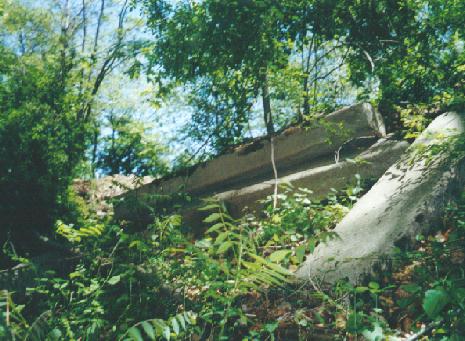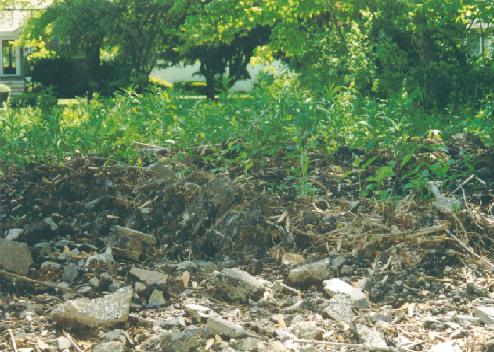OPEN DUMPS & LITTER - when not cleaned-up on a timely basis violates federal law - see below. Construction waste deposited in open dumps sometimes masquerades as 'clean fill' in Pennsylvania, see photos below. Some artificial coral reefs can also be thinly disguised dump sites. See: http://www.garbagestate.com


(asphalt waste - left photo, concrete waste - right photo)
What do concerned citizens do when public officials appear to be taking inappropriate actions? You may send them a 'certified-return receipt' letter, such as the one below, documenting your concerns and all relevant information. It is possible that your letter could be used in any legal action, particularly involving personal injury or property damage.
September 7, 1999
DEAR Yardley Borough Council, Yardley Borough Solicitor, Yardley Borough Planning Commission, Yardley Borough Planning Commission Solicitor, Lower Makefield Township Supervisors, Lower Makefield Township Solicitor, Lower Makefield Township Planning Commission, Lower Makefield Township Planning Commission Solicitor:
There have been several past and present incidents of unregulated, often scattered, open dumping of wastes on properties (not at waste facilities), in both Lower Makefield Township and Yardley Borough. The waste is often construction/demolition (C/D) debris, particularly asphalt waste. To date, both municipalities appear to be taking the Pennsylvania Department of Environmental Protection’s (PA DEP) position that, it is legal to dump on property (not disposed of at waste facilities), without a permit, certain C/D wastes. However, any open dumping appears to be illegal under Federal law. State environmental laws only prevail if they are more stringent than federal law. In this case, Pennsylvania regulations appear to be in violation of the U.S. Solid Waste Disposal Act.
According to Mike Giuranna of the EPA Region III, "Pennsylvania Code 271.101 (b) (3) says a person or municipality is not required to obtain a permit for the use of clean fill of the following materials if they are separate from other waste (I) Uncontaminated soil, rock, stone, gravel, unused brick, and block and concrete (ii) Waste from land clearing, grubbing and excavation, including trees, brush, stumps and vegetative material. Their definition of Clean Fill on page 271-4 also supports this practice." PA DEP’s definition includes asphalt.
It should be noted that PA DEP’s publication, 6/12/98 "Update" reported that, "Lead was the only pollutant (in asphalt) detected at levels higher than EPA standards."
Online "Clean Fill" regulatory information from the PA DEP:
Pennsylvania’s environmental regulations are often not in compliance with (i.e., in violation of) federal environmental laws (see attachment from The Raymond Proffitt Foundation). The EPA has a long record of non-enforcement of compliance by the states. On June 7, 1998, The New York Times reported in a front-page article on EPA's widespread failure to enforce air and water environmental laws, as reported by the EPA's Office of Inspector General. The Times followed-up with a June 11th editorial urging the EPA's Carol Browner to enforce federal environmental laws.
Regardless of Pennsylvania state regulations that describe asphalt and concrete as "clean fill", under the federal definitions below, it appears that, 1) The debris constitutes a health and safety hazard, particularly in regards to the possibility of sinkholes developing, 2) The debris qualifies as hazardous material under federal law, and 3) the practice of open (i.e., unregulated) dumping of any waste, hazardous or non-hazardous, is a violation of federal law.
I am concerned that any municipality that allows open dumping, and has been made aware, on the basis of credible information (see below: federal regulations regarding ‘open dumps’), that the dumping may be a violation of federal law (regardless of state laws), could be held liable (either individually or as a municipality) for personal injury or property damages that may occur if the properties are not fully remediated. (See attachment of Landes resume)
Respectfully yours,
Lynn Landes, Founder and Director
ZeroWasteAmerica.org
lynnlandes@earthlink.net
cc: The Honorable Joseph Conti
The Honorable David Steil
Attachments (2)
Construction/Demolition (C/D) debris is described in U.S. Environmental Protection Agency website - http://www.epa.gov/epaoswer/hazwaste/sqg/demol.htm .
"Construction and Demolition (C/D) Debris is waste material that is produced in the process of construction, renovation, or demolition of structures. Structures include buildings of all types (both residential and nonresidential) as well as roads and bridges. Components of C&D debris typically include concrete, asphalt, wood, metals, gypsum wallboard, and roofing. Land clearing debris, such as stumps, rocks, and dirt, are also included in some state definitions of C&D debris."
U.S. EPA information relating to Open Dumps and Construction/Demolition Debris
TITLE 42 - THE PUBLIC HEALTH AND WELFARE
CHAPTER 82 - SOLID WASTE DISPOSAL
SUBCHAPTER I - GENERAL PROVISIONS
Sec. 6902. Objectives and national policy
http://www4.law.cornell.edu/uscode/42/6902.html
(3) prohibiting future open dumping on the land and requiring the conversion of existing open dumps to facilities which do not pose a danger to the environment or to health;
(b) National policy
The Congress hereby declares it to be the national policy of the United States that, wherever feasible, the generation of hazardous waste is to be reduced or eliminated as expeditiously as possible. Waste that is nevertheless generated should be treated, stored, or disposed of so as to minimize the present and future threat to human health and the environment.
__________________________________________
Sec. 6903. Definitions
http://www4.law.cornell.edu/uscode/42/6903.html
(3) The term ''disposal'' means the discharge, deposit, injection, dumping, spilling, leaking, or placing of any solid waste or hazardous waste into or on any land or water so that such solid waste or hazardous waste or any constituent thereof may enter the environment or be emitted into the air or discharged into any waters, including ground waters.
(5) The term ''hazardous waste'' means a solid waste, or combination of solid wastes, which because of its quantity, concentration, or physical, chemical, or infectious characteristics may -
(A) cause, or significantly contribute to an increase in mortality or an increase in serious irreversible, or incapacitating reversible, illness; or
(B) pose a substantial present or potential hazard to human health or the environment when improperly treated, stored, transported, or disposed of, or otherwise managed.
The term ''open dump'' means any facility or site where solid waste is disposed of which is not a sanitary landfill which meets the criteria promulgated under section 6944 of this title and which is not a facility for disposal of hazardous waste.
The term ''solid waste'' means any garbage, refuse, sludge from a waste treatment plant, water supply treatment plant, or air pollution control facility and other discarded material, including solid, liquid, semisolid, or contained gaseous material resulting from industrial, commercial, mining, and agricultural operations, and from community activities, but does not include solid or dissolved material in domestic sewage, or solid or dissolved materials in irrigation return flows or industrial discharges which are point sources subject to permits under section 1342 of title 33, or source, special nuclear, or byproduct material as defined by the Atomic Energy Act of 1954, as amended (68 Stat. 923) (42 U.S.C. 2011 et seq.).
__________________________________________
Sec. 6907. Solid waste management information and guidelines
http://www4.law.cornell.edu/uscode/42/6907.html
(a) Guidelines
Within one year of October 21, 1976, and from time to time thereafter, the Administrator shall, in cooperation with appropriate Federal, State, municipal, and inter-municipal agencies, and in consultation with other interested persons, and after public hearings, develop and publish suggested guidelines for solid waste management. Such suggested guidelines shall - provide minimum criteria to be used by the States to define those solid waste management practices which constitute the open dumping of solid waste or hazardous waste and are to be prohibited under subchapter IV of this chapter.
__________________________________________
SUBCHAPTER IV - STATE OR REGIONAL SOLID WASTE PLANS
Sec. 6944. Criteria for sanitary landfills; sanitary landfills required for all disposal
http://www4.law.cornell.edu/uscode/42/6944.html
(a) Criteria for sanitary landfills
Not later than one year after October 21, 1976, after consultation with the States, and after notice and public hearings, the Administrator shall promulgate regulations containing criteria for determining which facilitiesshall be classified as sanitary landfills and which shall be classified as open dumps within the meaning of this chapter. At a minimum, such criteria shall provide that a facility may be classified as a sanitary landfill and not an open dump only if there is no reasonable probability of adverse effects on health or the environment from disposal of solid waste at such facility. Such regulations may provide for the classification of the types of sanitary landfills.
(b) Disposal required to be in sanitary landfills, etc.
For purposes of complying with section 6943(2) [1] of this title each State plan shall prohibit the establishment of open dumps and contain a requirement that disposal of all solid waste within the State shall be in compliance with such section 6943(2)
(c) Effective date
The prohibition contained in subsection (b) of this section shall take effect on the date six months after the date of promulgation of regulations under subsection (a) of this section.
__________________________________________
Sec. 6945. Upgrading of open dumps
http://www4.law.cornell.edu/uscode/42/6945.html
(a) Closing or upgrading of existing open dumps
Upon promulgation of criteria under section 6907(a)(3) of this title, any solid waste management practice or disposal
of solid waste or hazardous waste which constitutes the open dumping of solid waste or hazardous waste is prohibited, except in the case of any practice or disposal of solid waste under a timetable or schedule for compliance established under this section. The prohibition contained in the preceding sentence shall be enforceable under section 6972 of this title against persons engaged in the act of open dumping. For purposes of complying with section 6943(a)(2) and 6943(a)(3) of this title, each State plan shall contain a requirement that all existing disposal facilities or sites for solid waste in such State which are open dumps listed in the inventory under subsection (b) of this section shall comply with such measures as may be promulgated by the Administrator to eliminate health hazards and minimize potential health hazards. Each such plan shall establish, for any entity which demonstrates that it has considered other public or private alternatives for solid waste management to comply with the prohibition on open dumping and is unable to utilize such alternatives to so comply, a timetable or schedule for compliance for such practice or disposal of solid waste which specifies a schedule of remedial measures, including an enforceable
sequence of actions or operations, leading to compliance with the prohibition on open dumping of solid waste within a reasonable time (not to exceed 5 years from the date of publication of criteria under section 6907(a)(3) of this title).
(b) Inventory
To assist the States in complying with section 6943(a)(3) of this title, not later than one year after promulgation of regulations under section 6944 of this title, the Administrator, with the cooperation of the Bureau of the Census shall publish an inventory of all disposal facilities or sites in the United States which are open dumps within the meaning of this chapter.
<< End >>
RELATED ZWA LINKS: